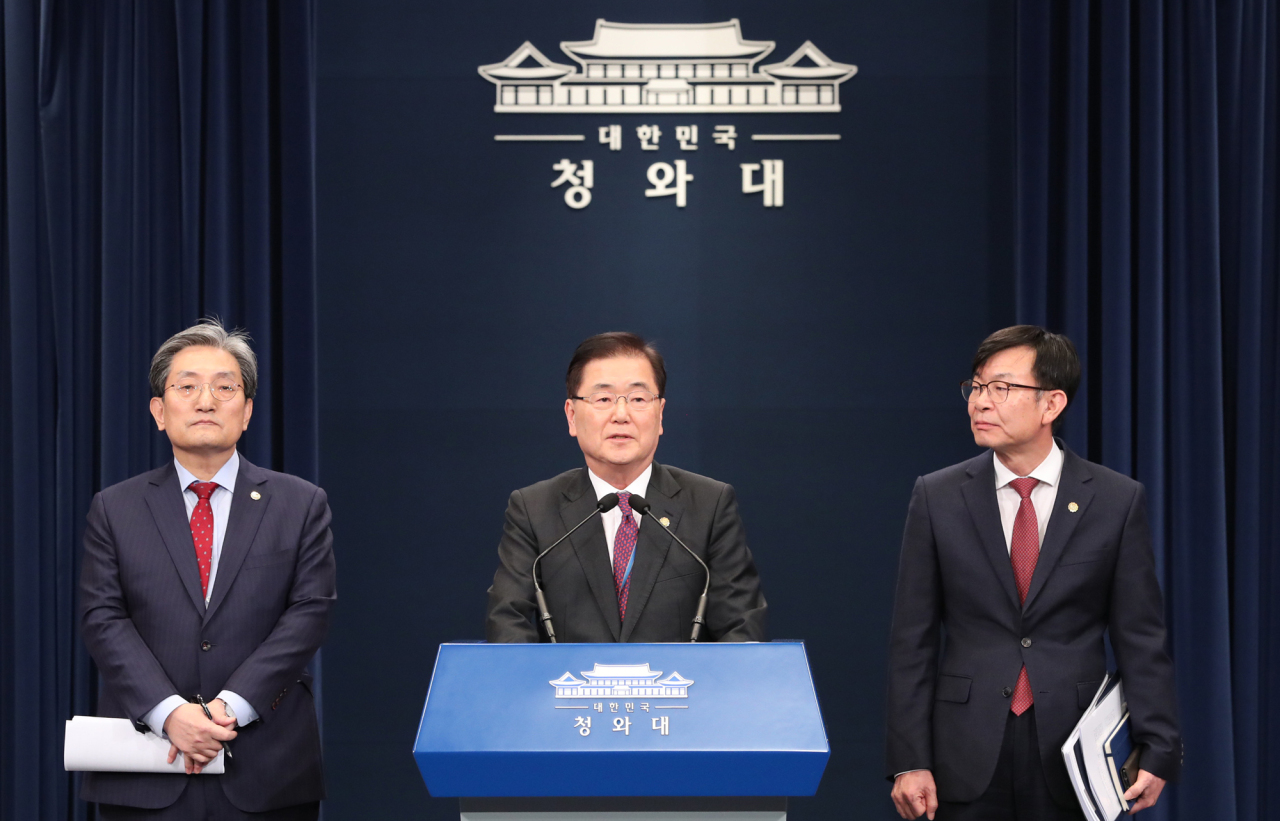November 11, 2019
Intelligence sharing has been suspended since an economic spat between the two countries erupted several months ago.
President Moon Jae-in’s top security adviser reaffirmed Sunday that South Korea’s bilateral military intelligence-sharing pact with Japan could be renewed, as the expiration date draws near.
Chung Eui-yong, chief of Cheong Wa Dae’s National Security Office, laid the blame on Japan for the strained relations, which have sunk to their lowest point in decades.
 |
“The government is willing to rethink an extension of the GSOMIA if South Korea-Japan relations normalize,” he said during a press briefing on Sunday, referring to the General Security of Military Information Agreement. The agreement drawn up in 2016 is renewed each year.
Chung said a termination of GSOMIA would have a limited impact on national security, as the bilateral exchange of military spy information will not be completely obstructed.
“I think the people will understand that (the government) cannot decide to extend the GSOMIA under current circumstances when Japan implemented export restrictions, citing that it has lost trust (toward Korea) in security cooperation,” he said.
The two Asian countries have not budged an inch on their respective positions regarding the renewal of the agreement, in order to gain the upper hand in their diplomatic and historical disputes.
Washington is seen as pressuring Seoul to maintain the defense pact for trilateral coordination among Seoul, Washington and Tokyo as it affects US security interests in the region in the face of North Korean military threats and China’s increasing assertiveness.
The South Korean government gave Tokyo the required three months’ notice on Aug. 23 that it would not renew the two countries’ military pact. The agreement is due to expire Nov. 23.
South Korea has maintained that it will consider reversing its decision to terminate the agreement only if Japan retracts its export restrictions on high-tech exports to South Korea and its decision to remove South Korea from its whitelist of trusted trading partners. The moves are seen as retaliation against South Korean Supreme Court rulings last year that ordered Japanese companies to pay compensations to South Korean victims of forced labor during Japan’s colonial rule over the Korean peninsula.
Seoul and Tokyo are taking different approaches on the GSOMIA issue and it appears to be hard for them to make concessions without a stronger justification than Washington’s pressure to keep the pact alive, said Lee Won-deog, a professor of Japanese studies at Kookmin University.
“The South Korean government wants to exchange the renewal of the GSOMIA with withdrawal of Japan’s trade curbs but what Japan wants is a resolution of the forced labor issue,” he said.
In recent weeks, the US and Japan have stressed the growing security challenges that the East Asian region faces.
The US Pentagon mentioned countering North Korea and other countries including China, Russia and Iran in a report released Nov. 4, calling this one of the top 10 challenges the US faces in 2020.
“North Korea also presents a dangerous threat to the United States and its allies. … North Korea may already be able to launch a nuclear weapon capable of reaching the United States,” the report read.
US Defense Secretary Mark Esper, who will travel to Seoul on Thursday, will also discuss the Seoul-Tokyo defense pact during his visit.
“It’s something that we would like to see resolved, so that all of us can focus on the biggest threats in the region, which is North Korea’s activities and then, the Chinese efforts to destabilize the region,” Pentagon spokesman Jonathan Hoffman said during a briefing Thursday.
Esper is likely to discuss potential solutions for the fate of GSOMIA while attending the US-South Korea Security Consultative Meeting, which will take place Friday.
Japan’s Chief Cabinet Secretary Yoshihide Suga asserted that Japan’s export restrictions and GSOMIA are two separate issues of different dimensions.
He said South Korea’s decision to end the pact “completely misjudges the region’s security landscape and is extremely disappointing.”
The two countries could make a last-ditch effort on the occasion of upcoming ministerial-level events set to take place before GSOMIA expires.
Defense Minister Jeong Kyeong-doo and his Japanese counterpart, Taro Kono, are reportedly considering a bilateral meeting on the sidelines of the ASEAN Defense Ministers’ Meeting, which will take place in Thailand on Nov. 18.
Foreign Minister Kang and her Japanese counterpart, Toshimitsu Motegi, also may hold face-to-face talks on the issue on the margins of the G20 foreign ministers’ meeting in Nagoya on Nov. 22 and 23.


